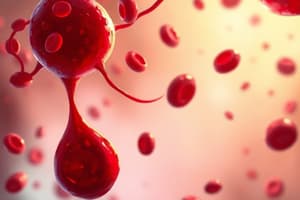Podcast
Questions and Answers
What is the primary function of hemoglobin in the blood?
What is the primary function of hemoglobin in the blood?
- To aid in blood clotting
- To fight infection
- To transport oxygen (correct)
- To regulate blood pressure
Which component of blood contains hemoglobin?
Which component of blood contains hemoglobin?
- Plasma
- Platelets
- Red blood cells (correct)
- White blood cells
What is the main component of plasma that interacts with hemoglobin?
What is the main component of plasma that interacts with hemoglobin?
- Fibrinogen
- Water
- Glucose
- Dissolved gases (correct)
In which physiological process is hemoglobin primarily involved?
In which physiological process is hemoglobin primarily involved?
What happens to hemoglobin levels in the red blood cells during hypoxia?
What happens to hemoglobin levels in the red blood cells during hypoxia?
What is the primary role of lymph nodes in the lymphatic system?
What is the primary role of lymph nodes in the lymphatic system?
Which of the following accurately describes the structure of lymph vessels?
Which of the following accurately describes the structure of lymph vessels?
Which of the following white blood cells is least involved in fighting bacterial infections?
Which of the following white blood cells is least involved in fighting bacterial infections?
What type of cells are found in lymph nodes that help in digestion of pathogens?
What type of cells are found in lymph nodes that help in digestion of pathogens?
Which type of white blood cell is primarily responsible for producing antibodies?
Which type of white blood cell is primarily responsible for producing antibodies?
Which statement best describes the relationship between lymph and plasma?
Which statement best describes the relationship between lymph and plasma?
What function do macrophages serve within lymph nodes?
What function do macrophages serve within lymph nodes?
What is the primary function of eosinophils in the immune system?
What is the primary function of eosinophils in the immune system?
Which of the following white blood cells is known to increase during allergic reactions?
Which of the following white blood cells is known to increase during allergic reactions?
Which type of white blood cell possesses a large nucleus and can differentiate into macrophages?
Which type of white blood cell possesses a large nucleus and can differentiate into macrophages?
What do monocytes develop into when they leave the circulation and enter the tissues?
What do monocytes develop into when they leave the circulation and enter the tissues?
Which term describes tissue basophils?
Which term describes tissue basophils?
Which component of blood is responsible for carrying white blood cells?
Which component of blood is responsible for carrying white blood cells?
What type of white blood cell is classified as a leukocyte?
What type of white blood cell is classified as a leukocyte?
Which of the following statements about blood is true?
Which of the following statements about blood is true?
What is the primary function of the spleen in the immune system?
What is the primary function of the spleen in the immune system?
Which of the following best describes the location of the spleen?
Which of the following best describes the location of the spleen?
One of the main functions of the spleen includes?
One of the main functions of the spleen includes?
In terms of blood supply, what is an additional role the spleen plays?
In terms of blood supply, what is an additional role the spleen plays?
What aspect of the immune system is NOT associated with the spleen?
What aspect of the immune system is NOT associated with the spleen?
Flashcards are hidden until you start studying
Study Notes
Blood Components
- Plasma: Main fluid component of blood containing water, electrolytes, nutrients, hormones, and proteins including immunoglobulins and clotting factors.
- Hemoglobin (Hb): Key protein in red blood cells responsible for oxygen transport throughout the body.
White Blood Cells (Leukocytes)
- Five main types of mature white blood cells:
- Lymphocytes: Integral for adaptive immunity.
- Monocytes: Transform into macrophages upon entering tissues, crucial for engulfing pathogens and debris.
- Neutrophils: First responders to infections, effective in fighting bacteria.
- Eosinophils: Important in combating parasites and involved in allergic reactions.
- Basophils: Release histamine during inflammatory responses.
Lymphatic System
- Lymph Vessels: Walled, valved structures that transport lymph fluid, playing a significant role in immune responses and fluid homeostasis.
- Lymph Nodes: Small, bean-shaped structures that:
- Produce lymphocytes.
- Filter harmful substances from lymph fluid.
- Contain macrophages for digesting cellular debris and pathogens.
- Essential for the training and development of T lymphocytes.
Spleen
- Organ located in the upper left abdomen.
- Functions include:
- Filtering blood to remove worn-out red blood cells.
- Storing a reserve supply of blood for emergencies.
Studying That Suits You
Use AI to generate personalized quizzes and flashcards to suit your learning preferences.




